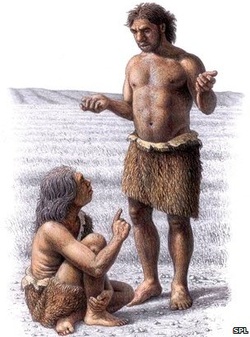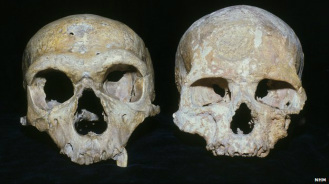
Our ancestors continued to enjoy bright and beautiful days in Africa and so had no need for such an adaption. Instead, Homo sapiens formed large groups. A larger brain is needed to process extra relationships in a community. They evolved their frontal lobes, associated with higher level thinking. This ability enabled our species, Homo Sapiens, to fashion warmer clothes and develop larger social networks, helping them to survive the ice age in Europe before they spread across the globe.
With a better ability to react quickly, to rely on their neighbors to help you survive and to pass on information gave the edge to Homo sapiens over Neanderthals.
Neanderthals may have been more intelligent that was once thought.

Fragments of a Homo sapiens tooth found in Italy and a jaw found in UK confirm that modern people overlapped in Europe with their evolutionary cousins, the Neanderthals, for between three to five thousand years. Tests on bone fragments make it clear that some species mixing must have occurred. DNA studies prove Neanderthals made a small but significant contribution to the genetics of many modern humans.
So: Sapiens' species survival stems from social skills whereas loner activities in the dark wiped out Neanderthal. Conclusion: Social networking is good.

 RSS Feed
RSS Feed






